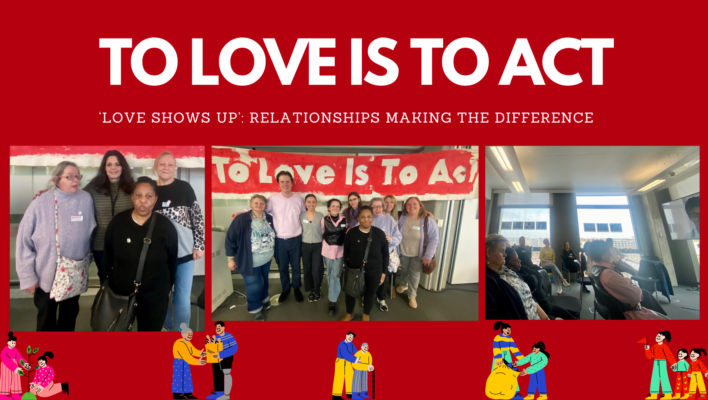‘Love Shows Up’: Relationships Making The Difference

Just before Valentine’s Day, on the 10th of February, eight participants from ATD attended this Camden Council event, which celebrated the importance of human relationships, including in public services. This event, held for the 4th year, and based on relational activism, challenges the faults of how the current system of social care operates in many places. Almost 100 people gathered from near and far, some with lived experience of poverty, others from wide-ranging occupations, yet all with the intentions to reshape social work into a more compassionate approach.
As one entered the main room, a welcoming and warm energy surrounded. Artist Trevor Appleson’s pieces coloured the walls, adding an artistic humanism to social work. A huge banner adorned with the relational activism motto “To Love Is To Act” was hung in the centre. Relational activist Michael H. Clarke explains this motto, saying:
“Love is an undoubted, unconditional, and underrated term for inclusion.”
To give people a chance to connect, an activity called ‘Mingle Mingle’ was set into action while music played; and each time the music stopped, individuals had to answer a question with the person they ended up next to. The question posed was to “describe a time when love showed up for you”. The same question was repeated each time (a technique inspired by Dr Julie Smith) and this deepened positivity, setting the atmosphere for the day.
Harnessing emotions
Different themes were explored, including
the power of place and finding balance in relationships.
The thought-provoking conversations each considered sympathetic methods of thinking within public services. Namely, the way that place can harness a mountain of emotions for us all, reigniting a memory field or a collective memory of a certain time period. Personal stories of numerous settings were narrated. A further point was mentioned: the way spaces within society are changing and certain areas have become underfunded, discouraging community cohesion.
This then bridged to the topic of social work settings and the importance of that moment when a social worker enters someone’s personal space, which can have ramifications if done in the wrong way. However, the impact can be life altering in a positive way when individuals have the opportunity to choose the setting, for example for a Family Group Conference.

Creating new narratives
It was moving and uplifting to listen to experiences recounted in a circle of pairs: people who have lived experience of the system; paired with their opposites, who supported them through that process and journeyed with them towards the light at the end of the tunnel. Unfair and unforgettable beginnings have been transformed into a sense of empowerment and action taken to prevent suffering for others. Many of the speakers were advocates who have lived through trauma caused by faults of public services but who now work within them.
Working alongside social workers, writers and psychologists, with their expertise, proved that new narratives are being created; narratives demonstrating that the power of altruism and shifting relationships in public services has a positive impact on society, families and individuals.
Co-production and inclusivity
Camden utilises unique strategies that treat people as people and not percentages on a chart. Their Family Group Conferences (FGCs) offer a space of collaborative conversation between families and professionals with the goal of providing guidance and information, as opposed to a process that determines outcomes. They also have a Family Advisory Board, a citizen-led board in which all members have lived experience of children’s services or FGCs in Camden. This board offers a space of co-production and inclusivity. ‘Camden Conversations’ was carried out through this platform, a research project written in collaboration with Royal Holloway, University of London. Parents interviewed other parents and social work professionals about their experiences of the child protection system, deciphering ways to improve it.
On the 2nd of February, the government launched a long-term strategy to fix children’s social care, with a £200 million budget to spend over the next two years.
Although they state that it aims to “transform the current care system to focus on more early support for families, reducing the need for crisis response at a later stage”, this is a shockingly low budget in comparison to previous years, pressurising those in the social work field even more. This highlights the necessity for people to come together at this difficult time and to adopt the more caring methods promoted by Camden to ensure that children and their families are not forgotten.
We would like to thank the Relational Activism team for hosting such a great event, which has left us feeling inspired and ready to take on challenges to push forward change. To see videos made by Relational Activism featuring members of ATD, please click here.

